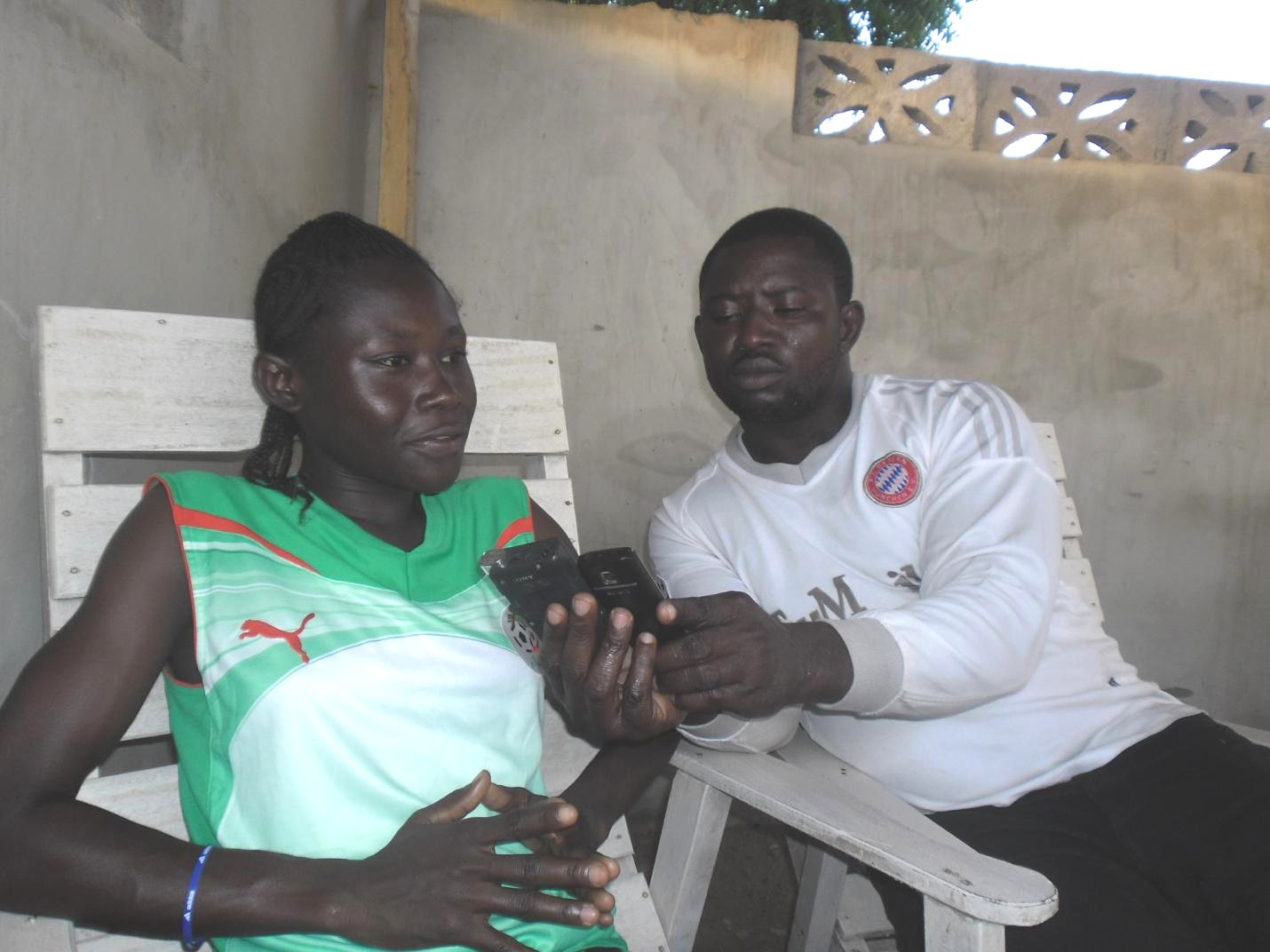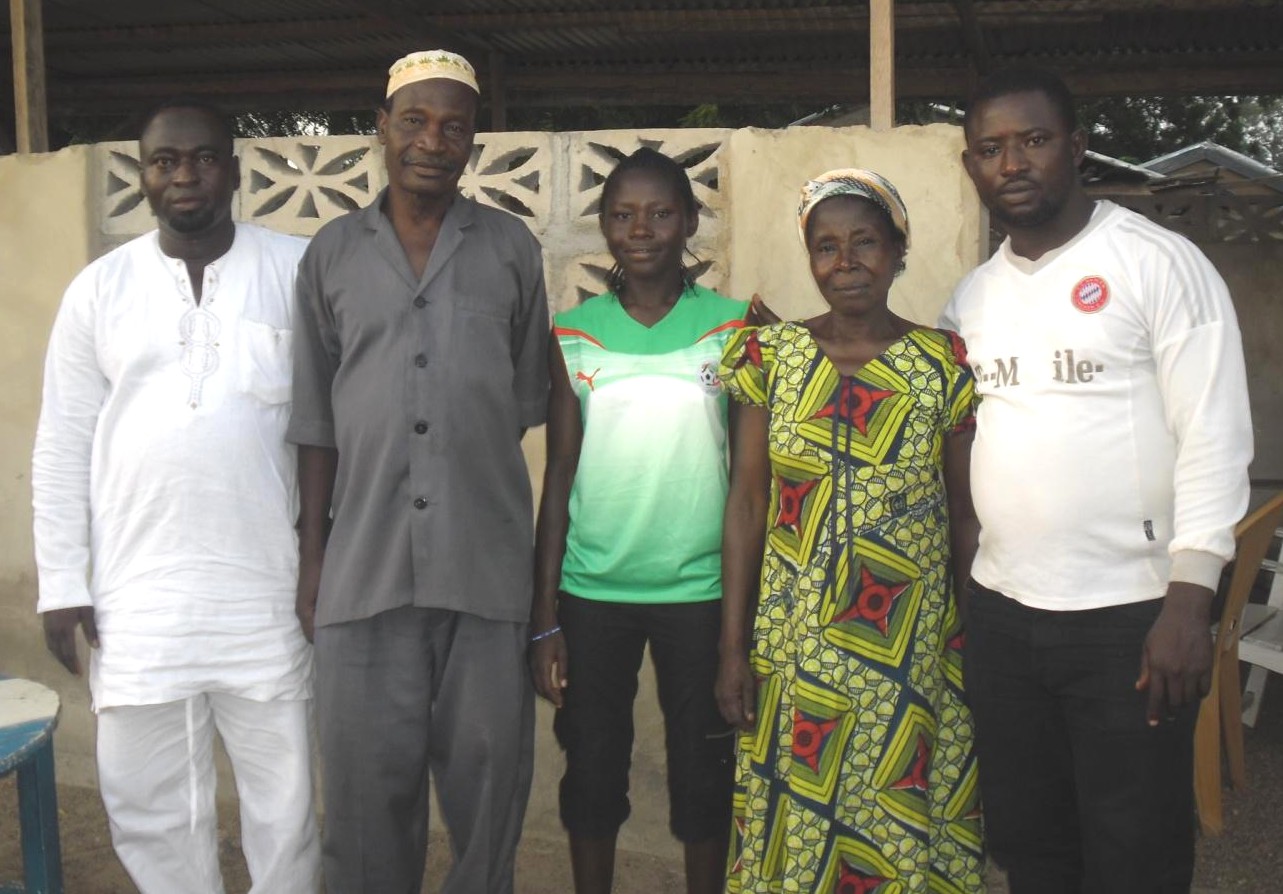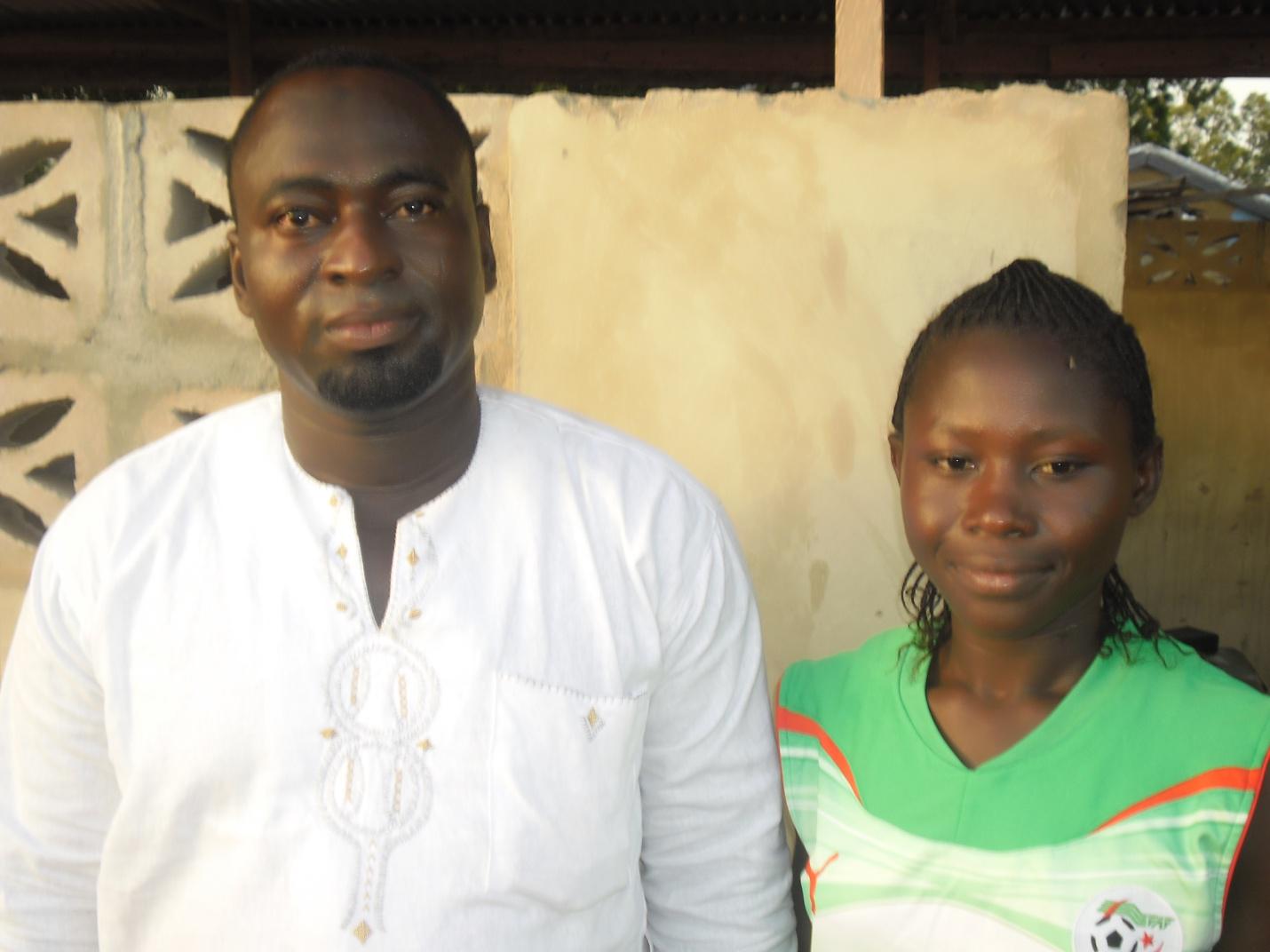
Evans interviewing Jane Ayieyam
Evans Akangyelwon Atuick (Interviewer)
Up and Close with Jane Ayieyam, the Foremost Black Maidens’ Strike, who hails from Bulsaland
Jane Ayieyam talking to Evans Akangyelewon Atuick
 |
|
Evans interviewing Jane Ayieyam
|
Evans:
Good evening.Jane: Good evening, coach.
Evans: I am Evans Atuick of Bulubisa Miena Yeri (BMY), a broad-based Bulsa social network that concerns itself with matters of interest and relevance relating to the development and welfare of Bulsa society. One area of focus is youth empowerment and community work. BMY works hand in hand with BULUK, Journal of Bulsa Culture and Society, which publishes works on Bulsa as well as events in our two districts. Your participation as lead striker of the Black Maidens [the women’s national team] in the just ended Under 17 Women’s Football World Cup in Azerbaijan and brilliant performance is an achievement that makes all Bulsa, and indeed football fans in the whole country, very proud. I am here to congratulate you personally, and on behalf of the entire membership of BMY, BULUK and the people and friends of Bulsa. You have done us a great honour. I would also like to ask you some questions about your person and your football career. We all know you as the striker of the Black Maidens. I don’t doubt that the readership of BULUK would like to know more about you. If I may ask, who is Jane Ayieyam
Jane: I am Jane Ayieyam Akalachiba, from Balansa, my father’s section at Sandema, and I am 14 years old. I was born to Mr and Mrs Ayieyam. That is, my mum is Akogtilie and my father, Michael Ayieyam. I was born in Sandema, not in the hospital but a compound of Sandema-Abilyeri. By then, my mum had just brought alcohol (akpeteshie) from Kumasi to sell; she just gave birth to me there, and because of that people, the old women and men in the compound, nicknamed me "Ajerikalie" (daughter of a gallon). I have seven siblings, four brothers and three sisters. My elder brother, Kofi, resides in Accra; and the second one, Joana Ayieyam, works with the Health Insurance. The third is Joyceline, popularly known as Donkor; the other one is Joe, they all know him in town. Francis comes after Joe, and I, Jane, after Francis. Our last born is Danjuma.
 |
|
From left to right: Abudu, Jane's father, Jane, Jane's mother, Evans Atuick
|
Evans: Thank you. Now tell us! How did you start life as a young girl? Where did you go to school?
Jane: I started school in Sandema Nursery, from there to Preparatory Primary School. When I was in primary two, I had to move to Bolga because of football. I attended the Sacred Heart of Jesus Primary School in Bolga and from there to JSS [Junior Secondary School] and later Bolga Technical Institute.
Evans: That means that you started playing football very early in your life.
Jane: Yes. That was in Bolga; I was then in class six. I think I was about nine years then, when I became serious with football.
Evans: Well, I am just curious. You might have been small then but you might still remember some things. Who managed to convince your parents to allow you to move to Bolga at that early age?
Jane: It was Columbia, that is, Abudu, who talked to my parents and when they called me to confirm, I said yes; I like the game. So they accepted to let me go.
Evans: So, you got to Bolga and then, what happened there?
Jane: Yes, when I went to Bolga; we were three in number, that is, I, Ida Apam and Selina Agoabasidu. We were all in Bolga and one of us decided to leave the football, remaining two of us. So, we were there playing and being paid by the sponsoring company, Ghana Telecom then, now Vodafone. When Ghana Telecom was sold to Vodafone they stopped taking care of us; they weren’t paying us, and so I was finding things difficult. We were feeding ourselves; buying water, soap and other things we needed. I had no money to be able to do that and so I came back to Sandema here. Whenever I asked my parents for money, they would tell me they didn’t have any, reproaching me at the same time for having left them and abandoned work in the house to go and play football.
So I decided to come back and stay at home. After some time, my uncle’s wife, Janet, living in Kumasi came to Sandema here. At that time Abudu and Frank organized a match here between Chuchuliga and Sandema ladies. I wanted to play the match and when the woman heard it, she told me that she didn’t know I could play football. Her son wanted to watch the game but she told him that they should go to Kumasi and she would call me to come there and play and they would see. When she got to Kumasi, she actually called me to come to Kumasi but my parents refused because they didn’t want me to go far away from them simply because of playing football. I decided to go without saying goodbye to them, because my uncle had given me money to take a car to Kumasi. However, upon second thoughts, I changed my mind and went to tell them that I was leaving. At that moment, I didn’t need anything from them; I only wanted them to agree and wish me well. I spoke to them, after my uncle had also spoken to them, they agreed to let me go. When I got to Kumasi, I went to Ash Town Ladies and I started training with them.
 |
|
Mr. Abudu (Columbia) and Jane Ayieyam |
Evans: Who took you to that club?
Jane: My uncle’s wife. She’s called Janet Ali. By then I didn’t know that Didi Dramani was the coach of the national under-17 side. I met that man in Tamale in 2006 when we were playing the zonal league and peace festival games in Tamale, where I played. There the man observed me, called me and spoke to me. By then he was the assistant coach of the Black Queens. We spoke about how he was going to help me but when I didn’t hear from him after sometime, I knew he was no longer going to help me. I then went back to Kumasi and when I went to the Black Princesses (under 20), I was dropped simply because they said I was not good enough. I also knew I wasn’t good enough since it was my first time of playing for the national team. I went back and started serious training in order to be able to deliver when I am called again. I was in Kumasi when Didi Dramani called and they said I am no longer in Bolga but in Kumasi. So they gave my coach’s number to him and he called him to let me come to Accra for camping. It was there that I started my career.
Evans: Wow! When the qualifiers started, you scored in Cameroun and where else?
Jane: I scored in Cameroun and when they came here I also scored; we went to South Africa and played 1-1 and when they came here, I didn’t score but I assisted them to score three good goals.
Evans: At the tournament itself, when you played the first match, how did you feel playing in a world cup with thousands of fans, including those of us at home, Bulsa and Ghanaians alike, watching you?
Jane: Hmmm!! Usually before we play any match, the coach would do the board work and show us how to play. As that was going on, I made up my mind that since this was my first world cup and I was also dropped from the under-20s, I would prove them wrong, I wanted to prove that I was good even though I was not popular enough for them to pick me. Strictly speaking, that was the first time that girls from the Upper East Region were taking part in the national team; it was always ladies from Tamale who went and played. I therefore decided that I was not only going to play but would play as if that was the final match itself, because I needed to work hard and prove to them that we have excellent
players in the Upper Region too. That explains why I brought out everything in me in the matches, and I had to fight for it.Evans: You were voted as one of the very best in the tournament. How did that make you feel, knowing your background?
Jane: I felt great because God had already ordained it, looking at the way He opened the chances for me. I was amazed but I have to thank God first for everything. I was however not happy because I didn’t play all the matches, especially the last one.
Evans: Yes, then came those two yellow cards and finally the red card for you. From where I sat watching the game, I thought you didn’t deserve the sending off but the referee sent you off. How then did you feel knowing fully well you won’t participate in the third place match?
Jane: I felt very bad because we were to play that match and qualify for the finals. It was not about me missing the next match or us losing the match but that even if we lost and were playing the third and fourth position match, one of us wouldn’t be there to play. That could create problems for the team. I felt bad because I didn’t deserve the second yellow card she gave me though I knew I deserved the first one because I stamped on that player. However, with the second, the referee whistled for foul and the girl wanted to run with the ball, so I blocked her; the referee then gave us the foul and still gave me a yellow card. If I had fouled her, the referee should have given the decision to our opponents instead of giving it to us again. I therefore felt sad throughout as I was just wondering how Ghanaians would talk about it.
Evans: Then came the third place match, where you sat in the stands and watched your colleagues playing, not wearing a jersey yourself. At that moment, what was going through your mind then?
Jane: I felt bad but I knew they were going to make it because our coach always trains two to three players for every position. I had also spoken to the girl who would play in my place and encouraged her to impress the people because that was her chance, too, to prove to the world that she is also good, just that we cannot all be fielded, as a football game allows only eleven players on each side. I just told them to work hard for me because I would be sitting there watching them. Initially I was feeling bad until the first goal came and then I became happy.
Evans: Now, let’s look at your arrival in Ghana after the tournament. How was it like being welcomed as a national hero given your humble beginning?
Jane: I was amazed at the way people came to the airport to meet us. Though we were told in Italy, by our coach, that there was a surprise awaiting us in Ghana, little did we know that people would come in their numbers to welcome us home. When we came out of the airport and saw the crowd, we were very happy because we didn’t even win the cup and yet got such a great reception. That meant that if we had brought the cup it would have been more than that.
Evans: After that you went to the Castle, Osu, to meet the president. I have never been to the castle but tell me, how did you feel after meeting the president himself?
Jane: I was very happy. If only you saw us in the castle! We were very excited because that was our first time of being there and meeting the president himself and the Vice. We were so amazed at that because we never knew we would ever go to the castle.
Evans: Now you came to Sandema and people came out in their numbers to welcome you. How did you feel when you saw how they welcomed you to your home town?
Jane: I was very happy. People even called me and I told them I was contented with the performance of our team. I never even dreamt of getting such a welcome before. When we went on break and I came to Kumasi they called and told me that this was
the day that they wanted to meet me. Because of that I just said I must come and see them and also thank them for their prayers and support. And you know, this is just the beginning and I am sure I will do things that would be greater than this, and I hope they will still receive me like they did the other time. In fact I was surprised at the way they received me and I am still grateful to them all for the wonderful reception given me.
.jpg) |
|
Jane in the World Cup Match (source: Ghanweb)
|
Evans: Who is your favourite footballer in the world?
Jane: That is Asamoah Gyan.
Evans: Why him and not Lionel Messi or C. Ronaldo who are big stars?
Jane: First, because he is my countryman and secondly, we both like using the number 3, and the way he is; he does things that concerns him and not what concerns people. Again, he is also disciplined. That is why I like him.
Evans: Okay. I am sure you know that he is now the captain of the Black Stars.
Jane: Yes!
Evans: So what are your own ambitions in football?
Jane: I also plan to be like him; becoming a professional footballer; playing abroad, and coming to play for Ghana whenever they have a match or a tournament. That is basically what I want to do in future.
Evans: Do you dream of captaining the Black Queens one day?
Jane: Yes I do.
Evans: Now, what advice do you have to give to other young girls like you; who have interest in football but are afraid to come out and pursue that dream?
Jane: What I have to tell them is that, they shouldn’t be afraid because football is a game that is very interesting. It is interesting not only because of playing the game but you get fans and discipline yourself too. They also have to take education seriously. Why? Because you cannot just go and play football without education, especially now that they are starting a female league in Ghana here. The GFA president said and I quote "this time we are not going to pick girls who don’t school to play football, it will only go with education." So they also have to take their education seriously because if you are not educated, you can’t play in the national team. So what I want to tell them is that they should take education seriously, be disciplined and then work very hard at it. You should never hide because given what I and my colleagues from the north did, the spotlight is now on the north ladies and if you are serious you can make it through football. They should be focussed and always train hard because that is the only key to getting to where I am now. They should also learn to be respectful and not only help at home but also obey their parents; whatever they tell them, they should listen to them and work hard. That is what I have for them.
Evans: What is your final word for your fans who have supported you this far?
Jane: Yes, just to thank them for what they have done. For the great support given me and that, God should bless them and that they should continue to pray for me. This is just the beginning; God willing, I will surely go higher and higher and I will raise Bulsa very high; and let them know that I am from Bulsaland and make them all proud. I thank them once again for everything.
Evans: We are also very proud of you for lifting the Bulsa flag very high. We thank you for doing so well for us; and pray that God will continue to open doors for you so that you will achieve all your dreams in future. We hope to see you play in Europe or America and eventually playing for, and even captaining the Black Queens very soon. Thank you once again for the time.
Jane: Thank you.